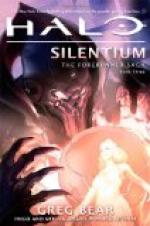Then he rose. “Come, we had better start to walk back.” She obeyed in silence.
“If I had not had genius,” he continued as they reached the bottom of the slope and turned homewards, “I should be now—what? A Norman peasant in a black blouse driving, probably, a char-a-bancs to sell my fruit—or my corn. I could never have been a gamekeeper like my father, for I cannot kill. And if you, then, had come to Falaise and gone to the market, you might have bought a pennyworth of cherries of me. And all this might have been if I had not, one day, heard an old half-witted blind man play a cracked fiddle on the high road, thirty years ago!”
She frowned, for she hated this kind of talk. It was too true, and it hurt her baser pride, even while her nobler pride rejoiced in the very humbleness of his origin because it emphasised his present greatness.
“But—you are you, and I am only—me,” she returned, ungrammatical but proudly humble.
He turned, his face flushing brilliantly. “Then you are proud of me?” he cried.
Danger again. After a long pause, which visibly hurt him, she returned with a smile, “Of course I am. Who would not be proud of such a father-in-law?”
Half an hour later it was all over, the wonderful day was finished, and to Brigit’s amazement she was more than a little glad. It had been delightful, but it had been full of danger.
In time Joyselle would learn to evade these pitfalls, with which their future seemed to bristle, but as yet he was so unused to avoiding things in his path that it was almost a miracle that she had, as she put it with a half-whimsical, half-despairing smile, got him safely home without an outburst.
She was, had been from the first, fairly sure of herself, but she was wise enough to acknowledge that her strength depended largely on his. If he had broken down, she knew that the odds were largely against her being able, in her inevitable despair over his certain-to-follow good-bye, to continue to hide her own feelings. And after that, she believed, he would never see her again.
So it was with a strong feeling of relief that she said good-bye to him, half-way home, and went on alone.
As the hansom started again she turned and looked back. Joyselle stood, hat in hand, where she had left him, his face, now that he believed himself to be unseen by her, black with thought. Then, with the so familiar jerk of his head, he put on his hat, smiled, and marched off down the street.
CHAPTER ELEVEN
One afternoon, a few days later, Tommy Kingsmead burst into his sister’s room where she was sitting writing.
“I say, Bick——”
“Hello, little boy, what’s the matter?”
Tommy shrugged his shoulders in close imitation of Joyselle.
“I don’t know, but something is. Very. It’s—Theo!”
She started. “Theo? He isn’t ill, is he?”




